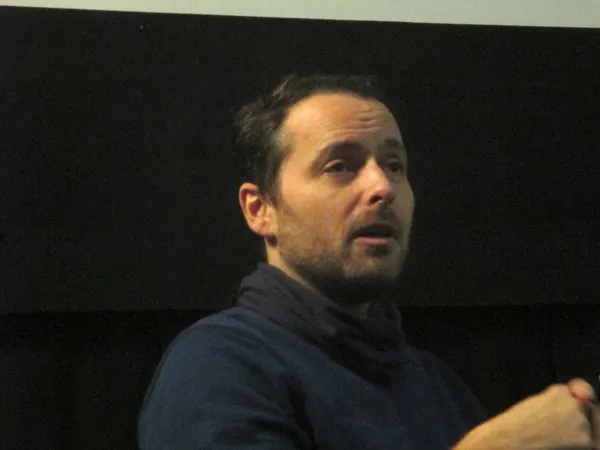Last Thursday night at the Cinema Eye Awards, Simon Lereng Wilmont, director/cinematographer of the Oscar-shortlisted The Distant Barking Of Dogs was presented with the Spotlight Prize by Bing Liu (Outstanding Achievement in Direction, Editing and First Feature for Minding The Gap), Sandi Tan (who won with Lucas Celler in the Graphic Design or Animation for Shirkers), and RaMell Ross (Outstanding Achievement in Nonfiction Feature Filmmaking winner for his Apichatpong Weerasethakul influenced Hale County This Morning, This Evening)
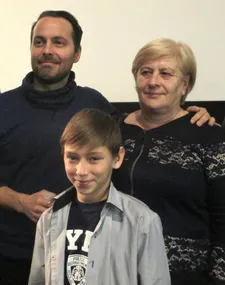 |
| Simon Lereng Wilmont with Oleg Afanasyev and his grandmother Alexandra Ryabichkina Photo: Anne-Katrin Titze |
I spoke with Simon about the score by Uno Helmersson (Elvira Lind's Bobbi Jene) and Erik Enocksson (Paul Wright's For Those in Peril) with additional music by Karsten Fundal (Feras Fayyad and Steen Johannessen's Last Men In Aleppo), the sound design, editing with Michael Aaglund, the importance of the stray dogs for the soldiers, and how the relationship evolved between him and Oleg, his grandmother Alexandra, and his younger cousin Yarik. Our conversation took place after an early morning screening and Q&A moderated by John Anderson for The Distant Barking Of Dogs at IFC Center in New York.
Simon Lereng Wilmont's tremendously forceful and courageous documentary drops us off with 10-year-old Oleg and his grandmother Alexandra, who live in the tiny Eastern Ukrainian village of Hnutove, a stone throw away from an active war zone. Oleg chops wood with all his might, puts flowers on his mother's grave, plays with an appreciative white kitten, and practices somersaults - onto the bed in front of a wall papered with peacocks - together with his cousin and best friend, little Yarik.
Dogs are barking in the background, and the ebb and flow of bombs and shells hitting the ground structure the nights and days. In school, the children share their knowledge of the dangers they face - the butterfly and tripwire mines. A boy announces "My father will go to war soon."
The frontline is right behind the hills. We see a tranquil landscape that no longer articulates peace. In their cellar, where Oleg and grandma are prepared to go when the fighting comes too close, the jars with pickled fruit and vegetables need to be secured on the shelves, so that they won't fall down and break with the earth trembling. Grandma sings a lullaby against the fear, his and hers (which she tries to keep hidden). A shell exploded two houses away the other night.
Yarik's mother Olena, who will leave the village to join her new soldier boyfriend has "Rapunzel" hair and two frogs are deprived of a happy ending when Kostya, the young boys' teenage friend comes armed.
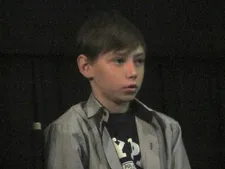 |
| Simon Lereng Wilmont on Oleg Afanasyev and the war: "It's the backdrop upon which his childhood is being played out." Photo: Anne-Katrin Titze |
Anne-Katrin Titze: We learn about a Ukrainian proverb that at home every dog is a lion. Did that proverb in any way influence you to pick the title? Besides the symbolism that is clear?
Simon Lereng Wilmont: No, the title was because when I was out to look at the trenches where the soldiers are, I noticed that there were a lot of wild dogs around, but they were feeding the dogs. I was curious about this, so I asked the soldiers "Why are you keeping the dogs around?"
And it's so low [cost] practical that it's an early warning system because dogs react quicker to motors or the sound of motors than human ears can pick up that sound. Then, you know, the barking of dogs became synonymous for me with the war, at least combat and battle. And then the distant barking became an inner image that the war is just on the other side of the hill, but it could be blowing this way, so to speak.
AKT: The way you show childhood, I think many people can identify with it, war zone or not. I saw myself in some of Oleg's adventures and you said you did too. Is childhood at the core of the film?
SLW: Absolutely. I have a twin brother and one of the things that I noticed very quickly is how much we are the same. Yarik and Oleg's relationship made me think of times that I spent with my twin brother when I was growing up.
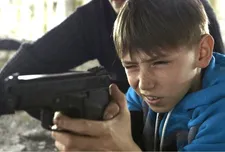 |
| Oleg Afanasyev with Kostya's gun in The Distant Barking Of Dogs |
I think that's also one of the reasons why I enjoyed so much hanging out with these kids because it was in a certain way reliving my childhood. I don't come from a war zone but in so many ways it looks exactly the same.
AKT: It felt that after Yarik was gone, you took his place. A little bit?
SLW: That might be right, yeah.
AKT: You included the warning not to go into the water alone! It is a great portrait of childhood games, in spite of the war. Some of the images are beautifully composed through shadows, plants, wallpaper. When you saw their house for the first time, were you thrilled to capture it?
SLW: It has been a cinematic blessing to be let into Oleg and Alexandra's life [Oleg's grandmother] from the very beginning. I was completely taken with the scenery and the interior of the house but obviously also the two main characters, the three or four main characters.
AKT: Even the cats!
SLW: Yeah, the cats, but everything just screamed, you know, "Take my photo!"
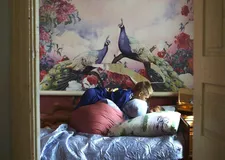 |
| Simon Lereng Wilmont on Oleg Afanasyev and his cousin Yarik Bendes: "Yarik and Oleg's relationship made me think of times that I spent with my twin brother when I was growing up." |
AKT: The landscape, too, with the seasons changing. It makes it relatable and not distant. The best films about war are the ones where you don't see the war.
SLW: That's exactly what was one of the ideas about the film. That we are only seeing and hearing what they are seeing and hearing. So if we don't see the war we don't see it in the film either. But we hear it and it's there all the time. And it's the backdrop upon which his childhood is being played out.
AKT: The sound recording and the music - that must have been a lot of decision making in the editing.
SLW: In the editing, yes.
AKT: But you kept the original sounds? Whenever we heard bombs, they were there?
SLW: Yeah. The set-up that I use is a small Lavalier and then a shotgun mic and they don't begin to capture how it feels like to be in a motor attack, for example. So we had to do some post work on it and in the beginning it would be too much. And then we would take it down until it reached the level where everybody could feel like this is how it is.
AKT: The grandmother's language is so poetic. That and Oleg's last name is why I asked if they were related to Alexander Afanasyev, the great 19th century Russian fairy tale collector. The storytelling tradition.
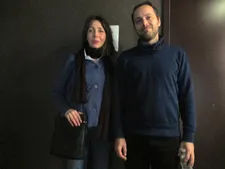 |
| Simon Lereng Wilmont with Anne-Katrin Titze on The Distant Barking Of Dogs: "We are only seeing and hearing what they are seeing and hearing." Photo: Ed Bahlman |
SLW: She might have people coming from there. The thing is, that I don't use interviews but I quickly realised that her perception of filmmakers or journalists is that they are doing interviews. So I began doing interviews with her. Not that I was going to use it, but I noticed that it calmed her down, because she had somebody to unload on.
And it was a good idea for me to gain an idea of what's happening between trips [to the region] and what she thinks will be happening in the future. And then at some point Azad [Safarov, Simon's interpreter] said "You have to get some of that translated. She is speaking so beautifully". And I went home and got it translated and was just like, okay, that's going to be the adult voice, so to speak, in the film.
AKT: By showing the school, you don't need any more explanation of what's happening. We see a full classroom at the beginning of the film and then there are ten pupils. And when they go into the basement shelter for practice with their teacher, one line says all we need to know.
She says, "Don't speak, because it's going to be hard to breathe." That explains war better than anything. Did you cut a lot because it is already self-explanatory?
SLW: Absolutely. You know, it's not everybody that realizes how many children are actually left by those two images of the school in the film. But for me that was enough. That said everything. And also, they weren't in school that much at the time because of influenza epidemic and all the other bad stuff that happens in regions like this.
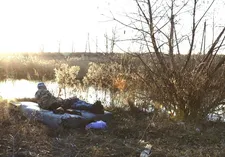 |
| Yarik Bendes and Oleg Afanasyev at the river: "Something bad comes, you have no control over it, and then it goes away. Hopefully as soon as possible." |
AKT: The war takes over control.
SLW: It controls your life almost like a nature force or something like that. Something bad comes, you have no control over it, and then it goes away. Hopefully as soon as possible.
AKT: The clothing the boys wear, where did it come from?
SLW: Football sweaters.
AKT: A lot of it with brand advertising, written in English, on it.
SLW: Once in a while NGOs come out to these villages with used clothing from a European or American country. And then they give it for free to the children. That's why a lot of the kids had those clothes on.
AKT: Did you feel that you wanted to help beyond the film?
SLW: So many times. Absolutely I'm trying to help as much as I'm able to do.
The five documentaries to receive Oscar nominations will be announced on Tuesday, January 22.
The Academy of Motion Picture Arts and Sciences celebration takes place on February 24.








